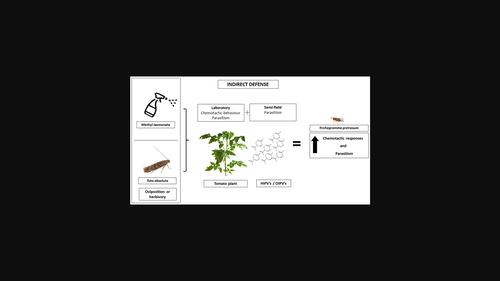当前位置:
X-MOL 学术
›
Entomol. Exp. Appl.
›
论文详情
Our official English website, www.x-mol.net, welcomes your
feedback! (Note: you will need to create a separate account there.)
Tomato plant defense induced by methyl jasmonate impacts on foraging behavior and parasitism of Trichogramma pretiosum
Entomologia Experimentalis et Applicata ( IF 1.4 ) Pub Date : 2023-01-12 , DOI: 10.1111/eea.13270 Nelson Cristiano Weber 1 , Josué Sant’Ana 1 , Luiza Rodrigues Redaelli 1 , Ezequiel Figueiredo Dawud 2
Entomologia Experimentalis et Applicata ( IF 1.4 ) Pub Date : 2023-01-12 , DOI: 10.1111/eea.13270 Nelson Cristiano Weber 1 , Josué Sant’Ana 1 , Luiza Rodrigues Redaelli 1 , Ezequiel Figueiredo Dawud 2
Affiliation

|
Indirect plant defense may be mediated by volatiles released after oviposition and/or herbivory or by exogenous application of plant hormones such as methyl jasmonate (MeJa), signaling host presence to parasitoids. There is still incipient information regarding phytohormone action on crop plant defense, especially among tomato plants (Solanum lycopersicum L., Solanaceae) and the parasitoid Trichogramma pretiosum Riley (Hymenoptera: Trichogrammatidae). We aimed to evaluate T. pretiosum chemotaxis and parasitism in response to eggs and tomato plants exposed to Tuta absoluta (Meyrick) (Lepidoptera: Gelichiidae) oviposition and herbivory, with and without MeJa. We conducted laboratory (olfactometry and parasitism) and semi-field (parasitism) bioassays with T. pretiosum in response to treatments with MeJa (0.5 mM) applied to tomato plants, and the interaction with its host, on plants with T. absoluta oviposition and herbivory. Methyl jasmonate presence directly on eggs did not affect T. pretiosum chemotaxis and parasitism. However, it did intensify this natural enemy's foraging behavior and parasitism when applied to the plant. Therefore, the use of MeJa in the T. absoluta and T. pretiosum tomato system may be beneficial, increasing parasitoid recognition and parasitism. Strategies aimed at improving biological control combined with environmentally friendly techniques, such as the use of phytohormones, are of utmost importance towards more sustainable agriculture.
中文翻译:

茉莉酸甲酯诱导的番茄植物防御对赤眼蜂觅食行为和寄生的影响
间接植物防御可能由产卵和/或食草动物后释放的挥发物介导,或由植物激素如茉莉酸甲酯 (MeJa) 的外源应用介导,向寄生蜂发出宿主存在信号。关于植物激素对作物植物防御作用的初步信息仍然存在,尤其是在番茄植物(Solanum lycopersicum L.,Solanaceae)和寄生蜂Trichogramma pretiosum Riley(膜翅目:Trichogrammatidae)中。我们的目的是评估T. pretiosum对暴露于Tuta absoluta的卵和番茄植株的趋化性和寄生性(Meyrick)(鳞翅目:Gelichiidae)产卵和食草,有和没有 MeJa。我们对T. pretiosum进行了实验室(嗅觉测定和寄生)和半现场(寄生)生物测定,以响应应用于番茄植物的 MeJa(0.5 mM)处理,以及与其宿主的相互作用,在具有T. absoluta产卵和食草动物。茉莉酸甲酯直接存在于卵上并不影响T. pretiosum趋化性和寄生性。然而,当应用于植物时,它确实加强了这种天敌的觅食行为和寄生性。因此,MeJa 在T. absoluta和T. pretiosum中的使用番茄系统可能是有益的,增加拟寄生物的识别和寄生。旨在改善生物控制并结合环境友好技术(例如植物激素的使用)的策略对于实现更可持续的农业至关重要。
更新日期:2023-01-12
中文翻译:

茉莉酸甲酯诱导的番茄植物防御对赤眼蜂觅食行为和寄生的影响
间接植物防御可能由产卵和/或食草动物后释放的挥发物介导,或由植物激素如茉莉酸甲酯 (MeJa) 的外源应用介导,向寄生蜂发出宿主存在信号。关于植物激素对作物植物防御作用的初步信息仍然存在,尤其是在番茄植物(Solanum lycopersicum L.,Solanaceae)和寄生蜂Trichogramma pretiosum Riley(膜翅目:Trichogrammatidae)中。我们的目的是评估T. pretiosum对暴露于Tuta absoluta的卵和番茄植株的趋化性和寄生性(Meyrick)(鳞翅目:Gelichiidae)产卵和食草,有和没有 MeJa。我们对T. pretiosum进行了实验室(嗅觉测定和寄生)和半现场(寄生)生物测定,以响应应用于番茄植物的 MeJa(0.5 mM)处理,以及与其宿主的相互作用,在具有T. absoluta产卵和食草动物。茉莉酸甲酯直接存在于卵上并不影响T. pretiosum趋化性和寄生性。然而,当应用于植物时,它确实加强了这种天敌的觅食行为和寄生性。因此,MeJa 在T. absoluta和T. pretiosum中的使用番茄系统可能是有益的,增加拟寄生物的识别和寄生。旨在改善生物控制并结合环境友好技术(例如植物激素的使用)的策略对于实现更可持续的农业至关重要。


















































 京公网安备 11010802027423号
京公网安备 11010802027423号